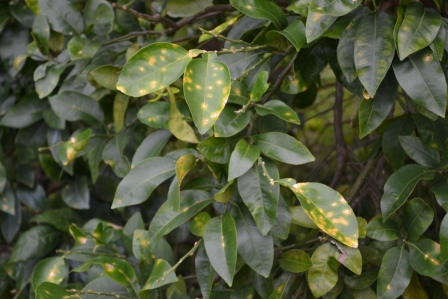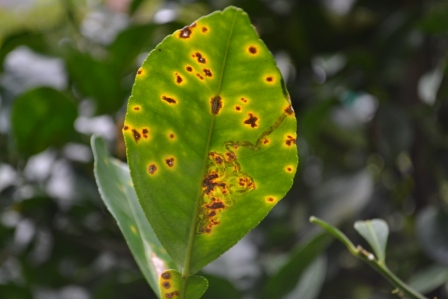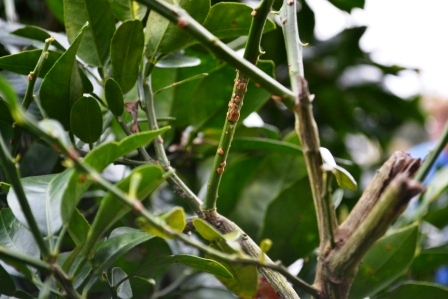
Authors: Blake Thaxton & Mary Derrick, UF/IFAS Extension – Santa Rosa Co. Mikaela Anderson, FDACS Division of Plant Inspection
Citrus canker is a serious disease of citrus trees that was recently confirmed for the first time in southern Santa Rosa County. Canker is caused by the bacterial pathogen Xanthomonas citri subsp. citri. Citrus canker has been a major pest of citrus in south and central Florida. It is economically damaging to the commercial industry and is also problematic to homeowners because it causes premature fruit drop, discolored fruit, and eventually causes the tree to become unproductive.
Canker was first introduced in 1912 into Florida and was declared eradicated in 1933. The disease was found again in the Tampa area on citrus in 1986. It was declared eradicated in 1994, but once again was found in 1995 in Miami. This time, the disease was not successfully eradicated in part because hurricanes made the disease too widespread to control. Despite its prevalence in south and central Florida, this disease has not been known in the Panhandle. The University of Florida and the Florida Department of Agriculture and Consumer Services’ Division of Plant Industry will be assessing the extent of the disease in Santa Rosa County in the coming months.

How might you know if your citrus is infected by canker? One of the best indicators of canker is the presence of lesions, diseased spots, on the upper and lower surfaces of the leaves. The lesions will be raised and have a rough surface and will be surrounded by yellow halos. Similar lesions may be present on the fruit and stems as well.
[important]If you suspect that your citrus trees may have citrus canker please contact the Division of Plant Industry’s Helpline Center at 1-888-397-1517 before taking any action to reduce accidental spread of this disease. [/important]

The disease is highly contagious to citrus only and spreads rapidly through wind, rain and via people on their hands, clothes, and tools. Do not transport any plant material that shows symptoms of canker. Decontamination practices should be used when going from one citrus tree to the next. Hand washing with soap and water for 20 seconds or more to eliminate bacterium on the skin should be practiced as well as using alcohol-based hand sanitizer. Pruning tools or other tools that come into contact with citrus should be disinfected by a fresh solution of 1 ounce of household bleach to 1 gallon of water. An old or dirty bleach solution is not able to disinfect because the chemical is no longer active.
[warning]Do Not Move a Plant Infected with Citrus Canker. Please Call your local Extension Office for further instructions[/warning]
For more information on citrus canker:
(The University of Florida IFAS Citrus Canker website provides a photo gallery of disease symptoms & information about the disease)
 0
0
